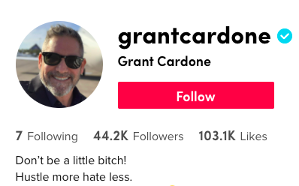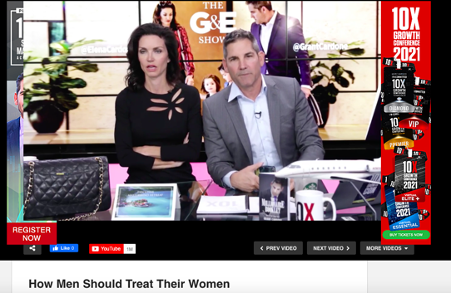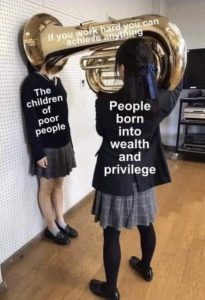“30 years. 18-hour days. Not 8-hour days, 10-hour days, 12-hour days, 18-hour days. If anybody thinks you can be successful without paying that price, you’re wrong.” – Grant Cardone
If you have an account on any of the most prominent social media platforms, you are already somewhat familiar with ‘hustlers’. Sure, you might have seen a relative promoting their side business or a distant friend sharing content about their start-up, but hustlers are something else. Think less personal and more marketable. In recent years, ex-life coaches, motivational speakers and business owners developed a habit of sharing their insights on being a successful entrepreneur – or ‘hustler’ – online.
The term ‘hustling’ was popularised two centuries ago, used both within and towards black communities in the US. Isabella Rosario explains that depending on the context, it either referred to demanding work conditions black people had to endure or was used in a derogatory sense to link black people’s labour to laziness. Then, “throughout the 20th century, hustle was used to describe the reality of what many poor black people had to do to make ends meet.”[1]
This version of ‘hustling’ recognises the inequality of the economic playing field, where engrained prejudice halts opportunities and access to better working conditions and better worker rights. Rosario notes that the term was eventually noticed by corporations like Uber in the mid-2010s when it was appropriated and slowly transformed into a label for a movement which worships the middle-aged white CEO. It rid itself of most race and class consciousness to give way for the contemporary digital hustler to form.
The hustler creates online content that matches the mannerisms and presentation of what we imagine a successful business owner may be. They provide life advice, share inspirational quotes and promise land of equal opportunity where anything is possible. The hustler is a capitalist hero. They observe the free market as it spontaneously evolves and harnesses its potential. How do I achieve anything I want? – you might ask the hustler. They provide answers: aim for constant productivity and dedicate most of your time to work. In short, you have to commit to the grind if you want to reach new heights. It’s like a digitized American Dream, repackaged into bite-sized shareable content. How does this dogma function online?


The Making of a Hustler
The hustler shudders at the thought of working a 9 to 5 job, ‘making someone else rich.’ They would rather make himself rich. If you do not succeed, well, you did not try hard enough. Inspirational entrepreneurial images and videos often rely on ‘masculine’ buzzwords and aspirations, inadvertently setting up an unrealistic standard for virtually everyone: those who aspire to live like this and those who don’t but are bombarded by the expectations anyway. Never give up, master your daily routine, work when they sleep, never look back, be your own boss, be confident, don’t you want this new watch or car? Don’t you want to provide financial security for your family? Working for someone else is not very masculine of you. You should take your future into your own hands.
“Pay the price today so you can pay any price in the future.” – Cardone
Take Grant Cardone, a real estate mogul who built his career in part providing entrepreneurial courses and life advice. As a hustler-influencer, he serves as a blueprint for other budding entrepreneurs and hustlers, showing up on social media feeds in a suit, showing off his lavish lifestyle, and promising you that you can do it too. In the same breath, he will claim that if you think life is too expensive, you are simply not making enough money. Do not stop to think why so many services are unattainable, sometimes for people who indeed work one, two, three jobs and still struggle to make ends meet. Structural issues and inequity dissolve in the eyes of the hustler-influencer. The identity of a hustler offers salvation from these dire circumstances, allowing entrance into a neoliberal haven where innovation and hard work always pay off, judged by the neutral gaze of the market.


In unscripted, chaotic news anchor-style videos accompanied by his wife Elena, Cardone rambles about what men should provide for women, cutting her off at every possible moment, and proclaiming authenticity is his best feature. He frames his derogatory and uneducated claims as something positive, unapologetic, masculine. Fellas, sometimes people will dislike you, and you just pay them no mind. “I’m just an authentic person. You either like me or you don’t,” he says, leaving no space for criticism or reflection, claiming they are distractions. And of course, his fans should follow if they want to stay focused on the things that matter; money, money, money.
Occasionally, in fragments taken from longer motivational videos, Cardone shares a down-to-earth anecdote or past struggle on social media to ensure you know that successful businessmen are just like you. And you can be like him if you commit.
Cardone blends business advice with personal advice, a popular approach amongst hustler-influencers. It comes as no surprise since their version of reality sees the individual and their profession as inseparable entities, a brand which depends on being perceived as a success. Keep following his content to grow your chance of making it big. Increase his wealth just in case it leads to increasing yours. And if it doesn’t, well, it might be time to purchase another coaching course. The creation of the hustler continues; he should be like Action Man, built to optimise his performance in the workplace and inside a nuclear family unit. It screams 1950s, except now the hustler also exists in code, on marketable websites and on social media apps, where he waits for the algorithm to match him with users in need of a little entrepreneurial inspiration.


Why join the grind?
The aspiring hustler asks: What is the point in working so many hours just to make someone else up top richer? Why am I expected to work 40+ hours a week in a job I do not find useful or fulfilling? What’s in it for me? Hustler-influencers answer; you cannot let yourself be exploited by some big corporation (but look at my one, how successful!). Don’t you want to be like me? I don’t have to worry about living from paycheck to paycheck. I don’t have to meticulously budget my expenses, I just spend. And you can have it too.
The aspiring hustler gives into the equal-opportunity narrative. They embrace the grind, deciding to utilise the ‘free market’ they simultaneously fear and worship to become a business owner or a CEO. And they wish to find others who are on a similar journey. Online hustle culture awaits, inviting them to join like-minded hard workers and dreamers who are not like the rest. Sometimes, the hustler is still a teenager, worried about their prospects and searching for alternative ways of making money. They find #grindtok or #hustletok and they are inspired. Look at these people, working for themselves and earning so much, making it look so easy. I want what they have. And the algorithm provides, offering videos like “Ages 13-25 and wanting to make money online?” or “How to make $50/hour even if you are just 14 years old!”. The pressure builds – what’s your excuse?
Forget inherited wealth, unethical business practices, manipulative marketing tactics, and capitalising on others’ financial worries. Hustling is an equal-opportunity endeavour, remember? Many budding entrepreneurs online ignore the skeletons dwelling in the closets of these figures. Besides, if overworking yourself is so glamorous, then those who are the most successful must be working the hardest. Right? The hustler-influencer is a creature of conflictual ambiguities, preaching hard work but automating and outsourcing much of the labour he performs. Claiming authenticity is his best asset, but operating like a charlatan, lining his own pockets while he promises you wealth. He praises small business endeavours, but supports tactics and policies that crush their potential, and elevate already well-established conglomerates. As long as you believe the hustler-influencer’s act, he will continue to benefit from the attention.


We all want financial freedom and fulfilment. But when we dream of freedom, we do not dream of exploitation. Still, such is the root of many businesses that hustlers and budding entrepreneurs idolise. On his never-ending path to exorbitant wealth, the aspiring hustler becomes a target of exploitation. A self-inflicted unsustainable work ethic makes their journey all the more painful. It makes them depend more on continuing help from hustler-influencers. Don’t stop until you succeed. No matter how compelling, this cult of the self-made entrepreneur is showing cracks and has been for some time. Echoing the growing criticism of ‘the hustle’ and marketable workaholism, many TikTok users identify glamorisation of exhaustion, gentrification, and manipulation in comment sections of hustle videos. I invite them to dream bigger and consider how the near future would look if we transitioned away from toxic productivity towards something more beneficial.
How to Be Hustle-Free
Fernández-Herrería and Martínez-Rodríguez propose a deconstruction of the neoliberal entrepreneurial self. They believe it is possible through the embrace of the Internet as a tool for establishing communication paths focused on cooperation and collaboration, not on predatory competition. In this way, a new identity can emerge; one “far removed from the capitalist worldview, now establishing emerging entrepreneurial visions which feed on values and forms of collaborative commons.”[2] In an adjusted search for community, the online hustler could soon find alternative bonds through the Internet of Things: advice instead of pressure, support instead of guilt, and connection instead of rivalry.
In the meantime, the aspiring hustler should allow themselves leisure time, rest, and critical reflection away from hustler-influencers and their clickable life advice. This is the only way to start to minimise immense pressure to perform, which inevitably leads to exhaustion and burnout. We must create some distance between our work and self-worth. This task is daunting since the waves of glamorised workaholism seem to be crashing from all sides. But if we challenge this way of thinking, we will preserve our mental health and function better in the long run. What would our routines look like if we were able to separate ourselves from our labour? Here, we might find enjoyment in daily tasks, and grow to appreciate many aspects of our lives we are often too busy to notice.
Aspiring entrepreneurs deserve better than empty promises from millionaires who sell unachievable daily routines and convince them to take big financial risks in exchange for the promise of eventual monetary gain in the future. At the centre of this is the conviction that hard work is empowering and a one-way ticket to success. Understandably, many people want this to be true. In a sense, it would signal a meritocracy and an equal-opportunity society.
However, this mentality serves the continual protection of individuals who stockpile wealth and utilise it to dominate industries, keeping smaller businesses from flourishing and silencing workers who demand better conditions. To deconstruct hustle culture, we must make it clear that so many business owners who are put on pedestals as self-made geniuses came from generational wealth, which increased their chance of launching and maintaining businesses. This perspective should help the hustler realise that reaching heights of Bezos, Zuckerberg or Musk is unachievable for reasons other than a lack of determination or self-discipline. Billionaires might humour new entrepreneurs and aspiring hustlers with quotable tips and tricks about productivity and hard work. It is nothing but a mirage. They have no profitable reason to expose their pitfalls and collective efforts on which they rely to maintain their conglomerates. But if we start to shift attention away from big business owners and hustler-influencers, we will make space for more meaningful bonds with like-minded people who deserve real advice and support from more reliable sources.


Following a passion, pursuing a career or starting a business all require resources, education, and support. We do not achieve anything alone, and it is in our collective interest to recognise the value in networks of support and care. There is work to be done. Debunking the myth of the great self-made CEO demands many structural changes. We can start by gathering together online and using the Internet of Things to our advantage. If an online hustler shares his productive 5 am morning routine, but no one is there to hear him, did he make a sound?
References
[1] Isabella Rosario, When The Hustle Isn’t Enough (npr.org), https://www.npr.org/sections/codeswitch/2020/04/03/826015780/when-the-hustle-isnt-enough?t=1612350702554 [Accessed 20 Jan 2021].
[2] Alfonso Fernández-Herrería, Fransisco Miguel Martínez-Rodríguez, “Deconstructing the neoliberal Entrepreneurial Self: A critical perspective derived from a global biophilic consciousness,” Policy Futures in Education, Vol. 14(3), pp. 314-326.

